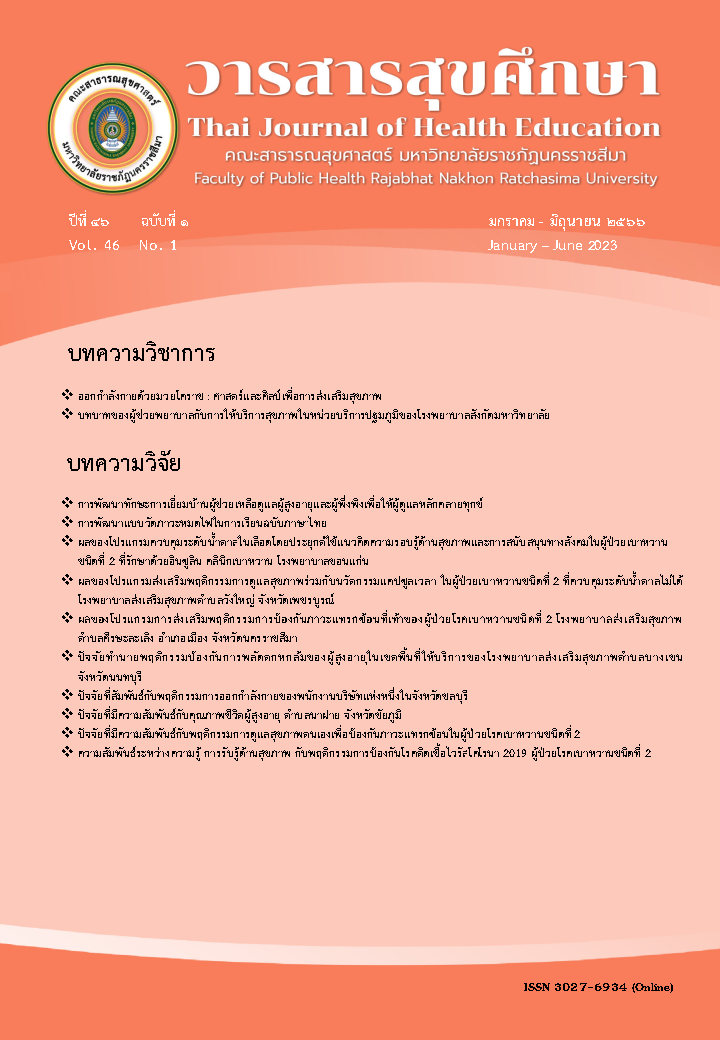ความสัมพันธ์ระหว่างความรู้ การรับรู้ด้านสุขภาพ กับพฤติกรรมการป้องกันโรคติดเชื้อไวรัส โคโรนา 2019 ผู้ป่วยโรคเบาหวานชนิดที่ 2
คำสำคัญ:
ความรู้, การรับรู้ด้านสุขภาพ, พฤติกรรมการป้องกันโรค Covid 2019, ผู้ป่วยโรคเบาหวานชนิดที่ 2บทคัดย่อ
พฤติกรรมการป้องกันโรคติดเชื้อไวรัสโคโรนา 2019 ในผู้ป่วยโรคเบาหวานชนิดที่ 2 มีความสำคัญ เนื่องจากผู้ป่วยที่มีการติดเชื้อไวรัสโคโรนา 2019 มีโอกาสเกิดภาวะแทรกซ้อนรุนแรงได้มากกว่าบุคคลอื่น การวิจัยภาคตัดขวางนี้ มีวัตถุประสงค์เพื่อศึกษา 1) ความรู้ การรับรู้ และพฤติกรรมการป้องกันโรคติดเชื้อไวรัสโคโรนา 2019 ในผู้ป่วยโรคเบาหวานตำบลหนองระเวียง อำเภอพิมาย จังหวัดนครราชสีมา 2) ความสัมพันธ์ระหว่างความรู้ การรับรู้ด้านสุขภาพกับพฤติกรรมการป้องกันโรคติดเชื้อไวรัสโคโรนา 2019 กลุ่มตัวอย่างจำนวน 217 คน โดยการสุ่มอย่างเป็นระบบ เครื่องมือการวิจัยคือแบบทดสอบและแบบสอบถามที่ผู้วิจัยสร้างขึ้น ค่าความเชื่อมั่น 0.71 และ 0.78 วิเคราะห์ข้อมูลโดยการแจกแจงความถี่ ร้อยละ ค่าเฉลี่ย ส่วนเบี่ยงเบนมาตรฐาน และสถิติสหสัมพันธ์ของเพียร์สันที่ระดับการมีนัยสำคัญทางสถิติ P < 0.05
ผลการวิจัย พบว่า ผู้ป่วยโรคเบาหวานชนิดที่ 2 มี 1) ระดับความรู้เกี่ยวกับโรคติดเชื้อไวรัสโคโรนา2019 อยู่ในระดับสูง (ร้อยละ 83.9) การรับรู้เกี่ยวกับโรคติดเชื้อไวรัสโคโรนา 2019 อยู่ในระดับสูง (ร้อยละ 93.5) พฤติกรรมการป้องกันเชื้อไวรัสโคโรนา 2019 อยู่ในระดับสูง (ร้อยละ 99.1) 2) ความรู้ การรับรู้ความเสี่ยง การรับรู้ความรุนแรง การรับรู้ประโยชน์ และการรับรู้อุปสรรค มีความสัมพันธ์กับพฤติกรรมการป้องกันโรคติดเชื้อไวรัสโคโรนา 2019 ของผู้ป่วยเบาหวานชนิดที่ 2 อย่างมีนัยสำคัญทางสถิติที่ระดับ .01 (r=0.21, 0.32, 0.54, 0.24 และ 0.29 ตามลำดับ)
ผลการศึกษาครั้งนี้สามารถนำไปประยุกต์ใช้ในการเสริมสร้างความรู้ และส่งเสริมพฤติกรรมการป้องกันโรคติดเชื้อไวรัสโคโรนา 2019 ของผู้ป่วยเบาหวานชนิดที่ 2 ต่อไป
เอกสารอ้างอิง
Hasyim, H, Putri, G, Dale,P. Kesmas: Jurnal Kesehatan Masyarakat Nasional (National Public Health Journal) 2022; 17 (Special Issue 1).
World Health Organization [WHO]. Global Situation (2022). [internet] 2022 [cited 2022 October 30). Available from: https://COVID-19.who.int/
World Health Organization [WHO]. Thailand Situation (2022). [internet] 2022 [cited 2022 October 30). Available from: https://COVID-19.who.int/region/searo/country/th
Yang J, Zheng Y, Gou X, Pu K, Chen Z, Guo Q, et al. Prevalence of comorbidities and its effects in patients infected with SARS-CoV-2: a systematic review and meta-analysis. Int J Infect Dis. 2020; May;94:91-95.
Subyani, A A., Fadel, H A, Bokhary, A., Ahmed, M., Ghunaim, M A., Alharbi, H H, Alghamdi, A K.,et al. Knowledge, Attitudes, and Practices of COVID-19 Safety Measures Among Type 1 Diabetes Mellitus Patients at King Abdulaziz University Hospital: A Cross-Sectional Study. Cureus. 2022; 14(8): e27713.
Nakhon Ratchasima Provincial Office COVID-19. The situation of the number of people infected with COVID-19. [internet] 2021 [cited 2021 October 30). Available from: https://COVID-19. nakhonratchasima.go.th/
Pender, N. J., Murdaugh, C. L., & Parsons, M. A.. Health promotion in nursing practice (5th ed). Upper Saddle River, N.J. Pearson Education; 2006.
Becker, M.H. The health belief model and sick role behavior. Health Education Monographs. 1974; 2(4): 409 – 19.
Limkunakul, C, Phuthomdee, S, Srinithiwat1, P, Chanthanaroj,S, Watchara,B, & and Sawanyawisuth, K. Factors associated with preventive behaviors for COVID-19 infection among healthcare workers by a health behavior model. Tropical Medicine and Health. 2022; 50(65): 2-7. (in Thai).
Lee, KW., Yap, SF., Ong, HT., Leong, PP., Mohamad, Hatta N. and Lye, MS. Knowledge, Perceptions and Behaviors Related to COVID-19 in a University Setting in Malaysia.Front. Public Health. 2022; 10:873022.
Melesie Taye G, Bose L, Beressa TB, Tefera GM, Mosisa B, Dinsa H, Birhanu A, Umeta G. COVID-19 Knowledge, Attitudes, and Prevention Practices Among People with Hypertension and Diabetes Mellitus Attending Public Health Facilities in Ambo, Ethiopia. Infect Drug Resist. 2020; Nov 23;13:4203-4214.
Udomlerd, M, Khiaolueang, D, Saengkhiew, P, Netchang,S, Prasitnarapun, R, Srijaiwong, S. Knowledge, Attitudes and Preventive Behaviors of COVID-19 among Nursing Students: Boromarajonani Collage of Nursing, Uttaradit Boromarajonani College of Nursing, Uttaradit Journal. 2022; 14(1):78-90. (in Thai).
Krejcie, R. V., & Morgan, D. W. Determining sample size for research activities. Educational and Psychological Measurement. 1970; 30(3), 607–610.
Bloom, B.S. Handbook on formative and summative evaluation of student learning. New York : McGraw–Hill. 1971.
Best, J. W. Research in Education Englewood Cliffs. New Jersy: Prentice Hall. 1978.
Khumsaen, N. Knowledge, Attitudes, and Preventive Behaviors of COVID-19 among People Living in Amphoe U-thong, Suphanburi Province. Journal of Prachomklao College of Nursing, Phetchaburi Province. 2021; 4(1): 33-48. (in Thai).
Ruengrueharn, P, Kedthongma, W, Phakdeekul, W. Prevention behaviors of coronavirus disease 2019 (COVID-19) of elderly with diabetes mellitus in sakon nakhon province. Research and Development Health System Journal. 2022; 15(2): 254-268. (in Thai).
Shi, Z., Yan, A., Zimmet, P., Sun X, Cristina do Vale Moreira N, Cheskin LJ, Wang L, Qu W, Yan H, Hussain A, Wang Y. COVID-19, Diabetes, and Associated Health Outcomes in China: Results from a Nationwide Survey of 10 545 Adults. Horm Metab Res. 2021; 53(5):301-310.
Matias, LDM., Lucena, JGS., Azevedo, TF., Silva, ALDA., Costa, MML., Andrade, LL. Factors related to the prevention of COVID-19 in people with diabetes: a cross-sectional study. Braz J Nurs. 2021; 20 Suppl 1:e20216517.
Rogers, E. M. Traditional midwives as family planning communication in Asia. Honolulu: The East West Communication Institute. 1978.
Rosenstovk, Irain M. The Health Belief Model and Prevention Behavior. Health Education Monographs. 1974; 2(4), 354-38.
Bunthan, w., Whaikit, p., Soysang, V., Soynahk, C., Akaratanapol, P., Kompayak, J. factor influencing to health promotion behavior for coronavirus disease 2019 (COVID-19) prevention of older adults. Journal of the Police Nurse. 2020; 12(2): 323-337. (in Thai).
Karimy, M., Bastami, F., Sharifat, R. et al. Factors related to preventive COVID-19 behaviors using health belief model among general population: a cross-sectional study in Iran. BMC Public Health. 2021; 21, 1934.
Zewdie A, Mose A, Sahle T, Bedewi J, Gashu M, Kebede N, Yimer A. The health belief model's ability to predict COVID-19 preventive behavior: A systematic review. SAGE Open Med. 2022; Jul 22;10:20503121221113668.
ดาวน์โหลด
เผยแพร่แล้ว
ฉบับ
ประเภทบทความ
สัญญาอนุญาต
ลิขสิทธิ์ (c) 2023 วารสารสุขศึกษา

อนุญาตภายใต้เงื่อนไข Creative Commons Attribution-NonCommercial-NoDerivatives 4.0 International License.



